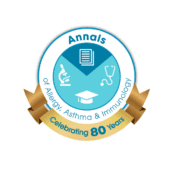- Show all
- Allergy
- Allergy Shots & Tablets (Immunotherapy)
- Allergy Symptoms
- Allergy Testing
- Allergy Treatment
- Anaphylaxis
- Asthma
- Asthma & Breathing Problems
- Asthma Symptoms
- Asthma Treatment
- Atopic Dermatitis
- Child Allergies
- Chronic Sinusitis
- Climate Change and Allergies
- COVID-19
- Disparities
- Drug Allergies
- Drug Sensitivity
- Ear infections
- Egg Allergies
- Environmental Trigger Avoidance
- EoE
- Epinephrine
- Eye Symptoms
- Flu
- Food Allergies
- Hay Fever
- Hereditary Angioedema (HAE)
- Home Environment Control
- Immunology
- Insect Allergies
- Latex Allergies
- Meat Allergy
- Milk Allergies
- Nasal Symptoms
- News
- Osteoporosis
- Other
- Peanut Allergies
- Peanut Allergies
- Pet Allergies
- Seasonal Allergies
- Severe Reactions, Anaphylaxis & Epinephrine
- Shellfish Allergies
- Skin Allergies
- Skin Symptoms (Itching, Hives, Etc)
- Vaccines
… results.
Slides #1
About one quarter (25.7%) of adults have a seasonal allergy, while nearly 1 in 5 children (18.9%) have a seasonal allergy.
Slides #2
Allergic diseases, which include asthma, are the fifth most prevalent chronic diseases in all ages, and the third most common in children.
Slides #3
Weather conditions such as extremely dry, wet or windy weather can worsen an asthma condition.
Slides #4
Asthma results in more than 94,000 hospitalizations in more than 986,000 million emergency room visits annually.
Previous slide
Next slide








